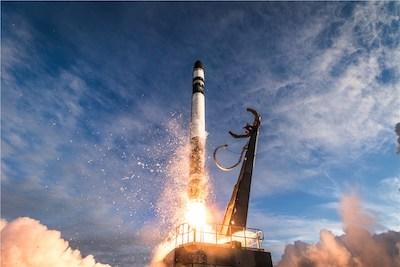Sat, Nov 27, 2021
CEO To Display Neutron Rocket at Virtual Event December 3
Rocket Lab has announced it will hold the first major update on the development of its upcoming Neutron Rocket system, a medium lift launch vehicle designed for constellation delivery, interplanetary missions, and, human spaceflight. A virtual event will be held on December 2, 2021 to let CEO and founder Peter Back show off some of the details about the Neutron's design, materials, propulsion, and reusable architecture.

The Electron has been a success for the company, becoming the second most frequently used American rocket since 2019. The follow on Neutron is designed to build on the successes of its younger sibling, with enhancements and expansion of utility to increase overall capability. Once complete, the Neutron will boast a roughly 26-fold improvement over the payload capacity of the Electron's relatively small 660lb limit, opening its mission profiles far beyond small satellite placement. The Neutron will integrate essential lessons learned over the last 3 years, allowing for a highly mission-ready, reliable, and sustainable system for launching commercial and government payloads, whether they are garden-variety satellite launches, deep space missions, resupply of orbital platforms, or manned spaceflight.

The Neutron, currently billed as a "mega constellation launcher", is a liquid oxygen and kerosene fueled rocket 131 feet tall, with a 4.5m diameter fairing, capable of hauling 3,300 pounds to Venus, or 17,600 pounds into low Earth orbit. The addition will open up additional launch capabilities in the Rocket Lab portfolio, possibly allowing them to duke it out with the Falcon 9 from SpaceX for appropriately-sized payloads. The Neutron is expected to fly in 2024 from the company's new launch site at NASA's Wallops Facility in Virginia, which will eventually launch future Electron Missions. To date, the majority of their activity has used Launch Complex 1, on the Mahia Peninsula in New Zealand. Rocket Lab announced recently that their efforts of aerial stage recovery have been advanced, expecting a field operation an upcoming flight sometime in 2022. With the smaller Electron rocket still under contract for continued satellite launches with BlackSky, there remain plenty of opportunities
for the system to grow into a hallmark of Rocket Lab operations.
FMI: www.rocketlabusa.com
More News
Aero Linx: Model Aeronautical Association of Australia MAAA clubs are about fun flying, camaraderie and community. For over 75 years, the MAAA has been Australia’s largest fl>[...]
Touchdown Zone Lighting Two rows of transverse light bars located symmetrically about the runway centerline normally at 100 foot intervals. The basic system extends 3,000 feet alon>[...]
“Discovery and innovation are central to our mission at Virgin Galactic. We’re excited to build on our successful record of facilitating scientific experiments in subor>[...]
How To Get A Story On Aero-TV News/Feature Programming How do I submit a story idea or lead to Aero-TV? If you would like to submit a story idea or lead, please contact Jim Campbel>[...]
Student Pilot Reported That During Rotation, “All Of A Sudden The Back Of The Plane Kicked To The Right..." Analysis: The student pilot reported that during rotation, “>[...]
 ANN's Daily Aero-Linx (05.02.24)
ANN's Daily Aero-Linx (05.02.24) ANN's Daily Aero-Term (05.02.24): Touchdown Zone Lighting
ANN's Daily Aero-Term (05.02.24): Touchdown Zone Lighting Aero-News: Quote of the Day (05.02.24)
Aero-News: Quote of the Day (05.02.24) ANN FAQ: Contributing To Aero-TV
ANN FAQ: Contributing To Aero-TV NTSB Final Report: Cirrus Design Corp SR20
NTSB Final Report: Cirrus Design Corp SR20




